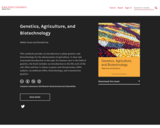
This is a book about Phylogenetic Comparative Methods by Luke J. Harmon.
- Subject:
- Genetics
- Life Science
- Material Type:
- Textbook
- Author:
- Luke J. Harmon
- Date Added:
- 12/05/2019

This is a book about Phylogenetic Comparative Methods by Luke J. Harmon.

This textbook provides an introduction to plant genetics and biotechnology for the advancement of agriculture. A clear and structured introduction to the topic for learners new to the field of genetics, the book includes: an introduction to the life cycle of the cell, DNA and how it relates to genes and chromosomes, DNA analysis, recombinant DNA, biotechnology, and transmission genetics.

This laboratory manual for Genetics was created under an ALG Affordable Materials Grant. Topics covered include cell cycle mutations, cancer detection, cytogenetics, forensics, and mapping chromosomes.

Precise modification of faulty genes for repair has been one of the most important goals in medicine. It is now finally within the realm of possibility thanks to the gene editing tool CRISPR. This microbial adaptive immune system can copy and cut specific DNA sequences. This animation provides a visual introduction of this revolutionary genetic tool.

Short Description:
This book provides an introduction to the genetic concepts of reproductive systems, recombination, mutation, segregation and linkage analysis, inbreeding, quantitative inheritance, fertility regulation, population genetics and polyploidy.
Long Description:
This book provides an introduction to the genetic concepts of reproductive systems, recombination, mutation, segregation and linkage analysis, inbreeding, quantitative inheritance, fertility regulation, population genetics and polyploidy.
Word Count: 61452
(Note: This resource's metadata has been created automatically by reformatting and/or combining the information that the author initially provided as part of a bulk import process.)
![Chromosomes, Genes, and Traits: An Introduction to Genetics [Revised Edition]](https://img.oercommons.org/160x134/microsite-viva-prod/media/upload/materials/screenshots/materials-course-6135.png)
This resource is intended for an introductory or intermediate-level college genetics course. It begins with an exploration of DNA and genome structure and continues with a study of the molecular mechanisms that drive gene expression. Concepts of classical transmission genetics are linked to the molecular mechanisms that underlie observable phenotypes. It concludes with specific topics that synthesize information from both molecular and transmission genetics, including consideration of topics like epigenetics, cancer biology, and evolution. Examples of both historical and current problems in genetics are presented, along with conversations of the relationship between genetics and society.

This is a lab manual for a course on Genetics.